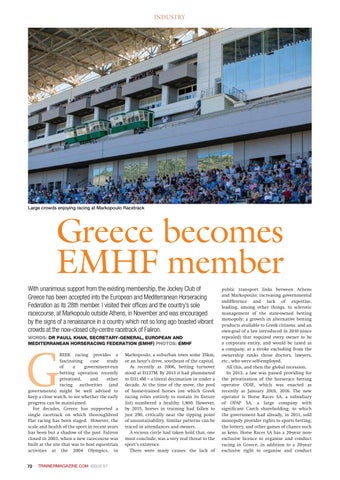INDUSTRY
Large crowds enjoying racing at Markopoulo Racetrack
Greece becomes EMHF member
With unanimous support from the existing membership, the Jockey Club of Greece has been accepted into the European and Mediterranean Horseracing Federation as its 28th member. I visited their offices and the country’s sole racecourse, at Markopoulo outside Athens, in November and was encouraged by the signs of a renaissance in a country which not so long ago boasted vibrant crowds at the now-closed city-centre racetrack of Faliron. WORDS: DR Paull Khan, SecRetaRy-GeneRal, euROPean anD MeDiteRRanean hORSeRacinG FeDeRatiOn (eMhF) PhOtOS: eMhF
G
REEK racing provides a fascinating case study of a government-run betting operation recently privatised, and other racing authorities (and governments) might be well advised to keep a close watch, to see whether the early progress can be maintained. For decades, Greece has supported a single racetrack on which thoroughbred Flat racing has been staged. However, the scale and health of the sport in recent years has been but a shadow of the past. Faliron closed in 2003, when a new racecourse was built at the site that was to host equestrian activities at the 2004 Olympics, in
72
Markopoulo, a suburban town some 35km, or an hour’s drive, southeast of the capital. As recently as 2006, betting turnover stood at €337M. By 2013 it had plummeted to €31.4M – a literal decimation in under a decade. At the time of the move, the pool of home-trained horses (on which Greek racing relies entirely to sustain its fixture list) numbered a healthy 1,800. However, by 2015, horses in training had fallen to just 290, critically near the tipping point of unsustainability. Similar patterns can be traced in attendances and owners. A vicious circle had taken hold that, one must conclude, was a very real threat to the sport’s existence. There were many causes: the lack of
public transport links between Athens and Markopoulo; increasing governmental indifference and lack of expertise, leading, among other things, to sclerotic management of the state-owned betting monopoly; a growth in alternative betting products available to Greek citizens; and an own-goal of a law introduced in 2010 (since repealed) that required every owner to be a corporate entity, and would be taxed as a company, at a stroke excluding from the ownership ranks those doctors, lawyers, etc., who were self-employed. All this, and then the global recession. In 2013, a law was passed providing for the privatisation of the horserace betting operator ODIE, which was enacted as recently as January 20th, 2016. The new operator is Horse Races SA, a subsidiary of OPAP SA, a large company with significant Czech shareholding, to which the government had already, in 2011, sold monopoly provider rights to sports betting, the lottery, and other games of chance such as keno. Horse Races SA has a 20-year nonexclusive licence to organise and conduct racing in Greece, in addition to a 20-year exclusive right to organise and conduct
TRAINERMAGAZINE.COM ISSUE 57
EURO TRAINER ISSUE 57 EMHF.indd 52
31/03/2017 09:57
